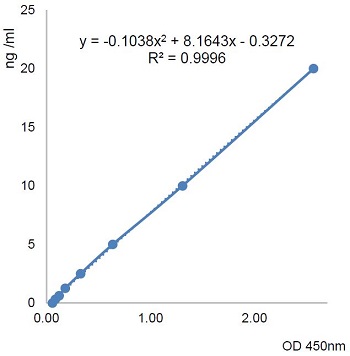B7-H3 [CD276] (human) ELISA Kit
| Code | Size | Price |
|---|
| AG-45B-0025-KI01 | 96 wells | £540.00 |
Quantity:
Prices exclude any Taxes / VAT
Overview
Regulatory Status: RUO
Target Species: Human
Shipping:
BLUE ICE
Storage:
+4°C
Images
Documents
Further Information
Alternate Names/Synonyms:
CD276; B7 Homolog 3; 4Ig-B7-H3
Assay Type:
Sandwich
Detection Type:
Colorimetric
EClass:
32160000
Handling Advice:
After standard reconstitution, prepare aliquots and store at -20°C.Avoid freeze/thaw cycles.Plate and reagents should reach room temperature before use.
Long Description:
Colorimetric Sandwich ELISA Assay. Detects human B7-H3 (CD276) in serum, plasma and cell culture supernatant. Range: 0.3125 to 20ng/ml. Sensitivity: 0.3ng/ml. Works in Cell Culture Supernatant, Plasma, Serum. B7 family of immunoregulatory proteins is composed of ten members: B7-1 (CD80), B7-2 (CD86), B7-H1 (PD-L1), B7-DC (PD-L2), B7-H2, B7-H3, B7-H4, B7-H5 (VISTA), B7-H6 and B7-H7. B7-H3 (or CD276) is a 316aa long type I transmembrane protein. B7-H3 shares 20-27% amino acid identity with other B7 family ligands. Glycosylated B7-H3 protein has a molecular weight of approximately 100 kDa. A B7-H3 'soluble' isoform has been detected in plasma and B7-H3 is also expressed on exosomes.
B7-H3 is ubiquitously expressed by cells in the non-hematopoietic compartment, such as fibroblasts and epithelial cells, it can be induced on T cells and NK cells. Although B7-H3 expression is elevated in tumors, B7-H3 is also constitutively expressed at higher levels in the liver than in other healthy tissue. B7-H3 mRNA is expressed in most normal tissues, but the B7-H3 protein expression is limited in normal tissues, because of its posttranscriptional regulation by miRNAs. Specifically, miRNA-29 suppresses B7-H3 expression in normal tissues by targeting the B7-H3 3'-untranslated mRNA region.
Little is known about the receptors for these B7-family ligands and their downstream signaling. TLT2 (triggering receptor expressed on myeloid cells-like transcript 2) has been characterized as a putative receptor for B7-H3, but it is dispensable for T cell response, suggesting that other unknown receptors should bind B7-H3. Although receptors remain unidentified, soluble B7-H3 has been shown to bind to CD4+ T, CD8+ T, NK and NKT cells and the extent of its binding is increased upon T cell activation.
B7-H3 inhibits the activation and function of T cells, potently suppressing the proliferation, cytokine production and cytotoxicity of activated T cells. It also inhibits natural killer (NK) cell activation and has a proinflammatory role leading to cytokine release from monocytes and/or macrophages, However, B7-H3 was initially characterized as a co-stimulatory molecule required for optimal promotion of T cell proliferation and cytokine production, which makes the exact role of B7-H3 controversial.
The B7-H3 [CD276] (human) ELISA Kit (Prod. No. AG-45B-0025) detects the soluble human B7-H3 (CD276) protein that is ectopically expressed in various cancers and its levels in serum of patients with cancer suggests it can be used as a noninvasive biomarker for diagnosis, prognosis and/or treatment response.
NCBI, Uniprot Number:
Q5ZPR3
Package Type:
Box
Product Description:
B7 family of immunoregulatory proteins is composed of ten members: B7-1 (CD80), B7-2 (CD86), B7-H1 (PD-L1), B7-DC (PD-L2), B7-H2, B7-H3, B7-H4, B7-H5 (VISTA), B7-H6 and B7-H7. B7-H3 (or CD276) is a 316aa long type I transmembrane protein. B7-H3 shares 20-27% amino acid identity with other B7 family ligands. Glycosylated B7-H3 protein has a molecular weight of approximately 100 kDa. A B7-H3 'soluble' isoform has been detected in plasma and B7-H3 is also expressed on exosomes. B7-H3 is ubiquitously expressed by cells in the non-hematopoietic compartment, such as fibroblasts and epithelial cells, it can be induced on T cells and NK cells. Although B7-H3 expression is elevated in tumors, B7-H3 is also constitutively expressed at higher levels in the liver than in other healthy tissue. B7-H3 mRNA is expressed in most normal tissues, but the B7-H3 protein expression is limited in normal tissues, because of its posttranscriptional regulation by miRNAs. Specifically, miRNA-29 suppresses B7-H3 expression in normal tissues by targeting the B7-H3 3'-untranslated mRNA region. Little is known about the receptors for these B7-family ligands and their downstream signaling. TLT2 (triggering receptor expressed on myeloid cells-like transcript 2) has been characterized as a putative receptor for B7-H3, but it is dispensable for T cell response, suggesting that other unknown receptors should bind B7-H3. Although receptors remain unidentified, soluble B7-H3 has been shown to bind to CD4+ T, CD8+ T, NK and NKT cells and the extent of its binding is increased upon T cell activation. B7-H3 inhibits the activation and function of T cells, potently suppressing the proliferation, cytokine production and cytotoxicity of activated T cells. It also inhibits natural killer (NK) cell activation and has a proinflammatory role leading to cytokine release from monocytes and/or macrophages, However, B7-H3 was initially characterized as a co-stimulatory molecule required for optimal promotion of T cell proliferation and cytokine production, which makes the exact role of B7-H3 controversial. The B7-H3 [CD276] (human) ELISA Kit (Prod. No. AG-45B-0025) detects the soluble human B7-H3 (CD276) protein that is ectopically expressed in various cancers and its levels in serum of patients with cancer suggests it can be used as a noninvasive biomarker for diagnosis, prognosis and/or treatment response.
Range:
0.3125 to 20ng/ml
Sample Type:
Cell Culture Supernatant, Plasma, Serum
Sensitivity:
0.3ng/ml
Specificity:
Detects human B7-H3 (CD276) in serum, plasma and cell culture supernatant.
Transportation:
Non-hazardous
UNSPSC Category:
ELISA Kits
UNSPSC Number:
41116126
Use & Stability:
12 months after the day of manufacturing. See expiry date on ELISA Kit box.



